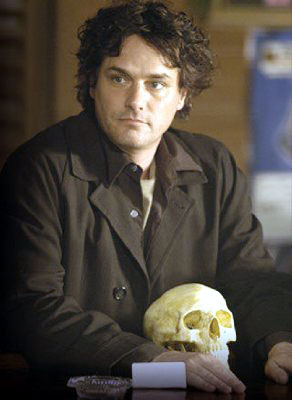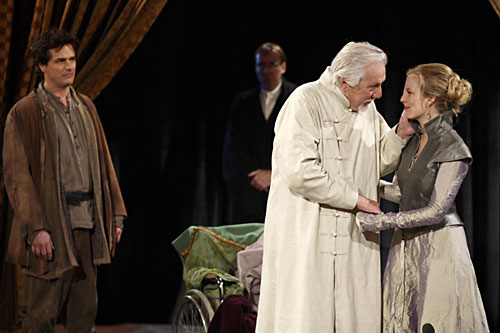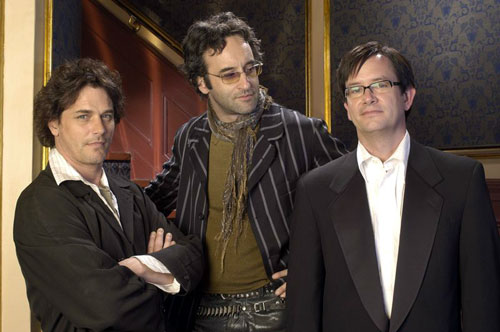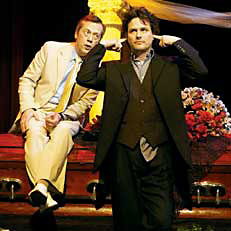|
Call the understudy;
I can't go on tonight.
I'm drinking with my buddy—
I'm getting good and tight.
Before the curtain rises,
I'll be higher than a kite.
So call the understudy--
I can't go on tonight!
This song by Lisa Lambert and Brian Morrison closes all but one of the eighteen episodes of Slings & Arrows, the Canadian television series about an annual Shakespeare festival in small-town Ontario. If you have ever seen the show, my guess is that you catch yourself singing that song every once in a while. And you're smiling when you do.
This summer I finally saw on DVD the complete series of Slings & Arrows, which was shown on Canadian cable in three six-episode installments between 2003 and 2006. In the U.S., the Sundance Channel showed Slings & Arrows between 2005 and 2007. As usual, I came late to the party, because I don't subscribe to premium cable. Based on a glowing newspaper review, I placed Season 1 of Slings & Arrows at the end of my always-overcrowded Netflix queue (I think it entered at #126). After about a year and a half, Season 1 finally appeared in my mailbox. After watching the six episodes on two discs, I did something I almost never do with a television series: I ordered Seasons 2 and 3 from Netflix immediately, placing them at the top of my queue. Then I did something I really never do: I bought the complete series.
In short, Slings & Arrows causes critics to exhaust their fund of superlatives pretty quickly.  From the time that drunken, demoralized New Burbage Shakespeare Festival Director Oliver Welles (Stephen Ouimette) is run over by a truck bearing the logo, "Canada's Best Hams," then comes back as a ghost to haunt his already unstable successor, Geoffrey Tennant (Paul Gross)—who is, appropriately, directing a new production of Hamlet—you know you are in for something unusually fresh, surprising, witty, hilarious, touching and engrossing. (See, I told you about the superlatives.) From the time that drunken, demoralized New Burbage Shakespeare Festival Director Oliver Welles (Stephen Ouimette) is run over by a truck bearing the logo, "Canada's Best Hams," then comes back as a ghost to haunt his already unstable successor, Geoffrey Tennant (Paul Gross)—who is, appropriately, directing a new production of Hamlet—you know you are in for something unusually fresh, surprising, witty, hilarious, touching and engrossing. (See, I told you about the superlatives.)
I have never seen anything else that so completely captures the joys and insecurities— financial, professional and emotional—of an actor's life. While I cannot claim to know much about that life, the people who made Slings & Arrows can. The series was the brainchild of the executives of Rhombus Media, a production company specializing in videos of stage performances, who decided it would be fun to produce a series about stage performances. The talent they recruited for the project was a virtual Who's Who of Canadian stage, film and TV, a surprising number of them triple threats as actor-writer-directors. (Most are stalwarts of the Stratford Festival, the most obvious model for New Burbage.) These are people who have seen the theatrical creative process from every conceivable angle, and as a consequence every frame, every line of dialogue, of Slings & Arrows glistens with sharp, witty, pungent truth.
Writers Susan Coyne, Bob Martin, and Mark McKinney (who also appear in the show) provide an interesting framework for Slings & Arrows. Each of the show's three seasons revolves around the production of a different Shakespeare play: Hamlet (representing youth) in Season 1, Macbeth (middle age) in Season 2, and King Lear (old age) in Season 3. That framework allows the authors to unleash a wild mix of plot twists and characters that illuminate every kind of trouble a theater company can get into
There are so many plot lines in Slings & Arrows that it is almost impossible to know where to begin. Let us start instead with the characters, and with one character in particular: Geoffrey Tennant, who could justly be nicknamed "TroubleMan." When we first see him, he is giving his landlord a bad check for the rental of the aptly named Theatre Sans Argent, then chaining himself to a door to prevent the landlord from evicting him. This is typical behavior for Geoffrey, who will say or do anything he sees fit to make his theatrical visions a reality. Geoffrey is a great believer in taking up arms against a sea of troubles and, by opposing, ending them. This is why, in Episode 3 of Season 1, he comes after the pretentious director Darren Nichols (Don McKellar) with dueling swords. In Season 2, Geoffrey devises an ingenious way to force smug superstar Henry Breedlove (Geraint Wyn Davies) to take his direction in Macbeth. In Season 3, he hires the legendary but mortally ill Charles Kingman (the late William Hutt, who died of leukemia less than a year after Season 3 premiered) to play Lear, hiding Kingman's illness from the board of directors and the rest of the cast. Mercurial and confrontational, Geoffrey antagonizes everybody at one time or another (it's a tradition that he gets punched out at least once every season). But there is no question that Geoffrey is a true theatrical genius--unlike the insufferable Darren, who cares only about shock value and dismisses everything and everyone else with a disdainful sneer.
 |
Geoffrey left the New Burbage Festival seven years before the show's beginning, suffering a nervous breakdown on stage while playing Hamlet. The direct cause of his breakdown was an act of sexual betrayal between Oliver, who was nominally gay, and Ellen Fanshaw (Martha Burns), Geoffrey's Ophelia onstage and fiancée offstage. The continuing fallout from this debacle fuels much of the plot. Needless to say, Geoffrey and Oliver have a number of unresolved issues. Oliver's ghost is the logical extension of the living man: waspish, mocking, sad at realizing he never lived up to his potential. In the tradition of Topper, not Hamlet, only Geoffrey can see Oliver, which of course allows for optimal embarrassment for Geoffrey. (He has a tendency to yell, "Shut the fuck up!" at Oliver at the most inopportune moments, such as during press interviews and children's plays.)
At the beginning of Season 1, Geoffrey and Ellen have not seen each other since Geoffrey's breakdown, and have no desire to do so. Though less crazy than Geoffrey, Ellen is a piece of work herself: a peculiarly Canadian diva, she rages at colleagues and underlings, then apologizes five seconds later. Totally "in the moment" at all times, she is incandescent on stage but constantly in chaos off of it, launching recklessly into love affairs (Matt FitzGerald, as Ellen's boy-toy Sloan, is a lovable highlight of Season 1) and trying to write off her bras and lipsticks as tax deductions. When Geoffrey finally asks Ellen why she went to bed with Oliver, she looks wistfully at him and says, "He was my director."
Other major characters include Richard Smith-Jones (McKinney), the festival's business manager, and Anna Conroy (Coyne), its office administrator. Richard is a bean counter who longs to be one of the festival's creative forces, or at least be regarded as one. His desire to achieve distinction and broaden the festival's audience leads him into the clutches of some dubious advisers, such as the scheming corporate sponsor Holly Day (Jennifer Irwin) and Sanjay (Colm Feore), the pixilated CEO of a "non-traditional" advertising company called Frog Hammer. Anna is the steady if beleaguered hand on New Burbage's tiller, steering a straight course even when beset by a horde of incompetent teenage interns, a group of refugee Bolivian musicians, or a playwright boyfriend (Jonathan Crombie) who regurgitates her undiluted life history into his plays.
 |
There are so many other great characters, too many to list: Maria (Catherine Fitch), the stage manager who hates actors with every fiber of her being; Jerry Appleby (Oliver Dennis), the eternal understudy who gets one brief shining moment in the spotlight; Jack Crew (Luke Kirby), an insecure Hollywood action star recruited to play Hamlet; Kate McNab (Rachel McAdams, just before she hit it big), Ophelia to Crew's Hamlet, who finds herself falling for him against her better judgment. My own favorites are Cyril (Graham Harley) and Frank (Michael Polley), a longtime gay couple who, by their own testimony, have acted at the New Burbage Festival since it was held under a tent. Cyril and Frank serve as the Greek chorus for Slings & Arrows, offering invaluable commentary on the proceedings. Through them, more than any of the other characters, we learn what it's like to be a foot soldier in the Thespian Army. It is Cyril and Frank who sing "Call the Understudy" and the other delightful Lambert-Morrison songs that grace Slings & Arrows. My own favorite is "Cheer Up, Hamlet," with the following lines: "Your incessant monologizing fills the castle with ennui;/Your antic disposition is embarrassing to see;/And by the way, you sulky brat, the answer is `to be!'"
With so much talent—some of it approaching genius—on display, the biggest question is why aren't these performers better known in the U.S.? Only McAdams approaches being a household name here. Gross—who is better looking than George Clooney and has the approximate emotional range of Dustin Hoffman—has made a few forays into American TV (Due South, Tales of the City, and the current Eastwick), and McKinney has some fame here as one of the Kids in the Hall. But they and most of the others seem adamant in their allegiance to Canada, which is admirable of them and wonderful for Canada if unfortunate for the rest of the world. Indeed, one of the most beguiling things about Slings & Arrows is how it captures the elusive but distinctive quality of Canadian-ness. (The extras on the Slings & Arrows DVD set include interviews with several of the show's creators and cast members, who discuss their efforts to create a distinctively Canadian theater scene and the difficulty of getting film and TV projects funded in Canada.)  Having spent a lifetime total of four weeks in Canada, I can scarcely be considered an expert on the Canadian state of mind, but it seems to be a combination of English politeness and modesty, American forthrightness, French clarity, and a certain quizzical je ne sais quoi that gives Canadian writers and performers an amused but sympathetic insight into the foibles of humankind. Watching Slings & Arrows, I can't shake the feeling that being Canadian is a very enviable thing. Canadians certainly make enviable Shakespearian actors; seeing bits on Slings & Arrows of Martha Burns' Gertrude and William Hutt's Lear, I want to see much, much more. Having spent a lifetime total of four weeks in Canada, I can scarcely be considered an expert on the Canadian state of mind, but it seems to be a combination of English politeness and modesty, American forthrightness, French clarity, and a certain quizzical je ne sais quoi that gives Canadian writers and performers an amused but sympathetic insight into the foibles of humankind. Watching Slings & Arrows, I can't shake the feeling that being Canadian is a very enviable thing. Canadians certainly make enviable Shakespearian actors; seeing bits on Slings & Arrows of Martha Burns' Gertrude and William Hutt's Lear, I want to see much, much more.
I love Slings & Arrows so much that I fear not doing it justice, on one hand, or overselling it, on the other. Its bawdy language and plot make it a poor choice for family viewing. However, the show is both hopeful and idealistic in its tone. Without giving away plot points, Slings & Arrows tells us that even if actors lose everything, they still have their art, and that is infinitely better than to gain the world's acclaim but lose your soul. At the very least, Slings & Arrows is the most scintillating backstage story since All About Eve. In my humble opinion, it's even better than that. I would like to think that a ghost familiar to all of us, with his domed forehead, flowing locks and neatly trimmed goatee, is standing in the wings, giving the creators and cast of Slings & Arrows some well-deserved applause.
|
|

